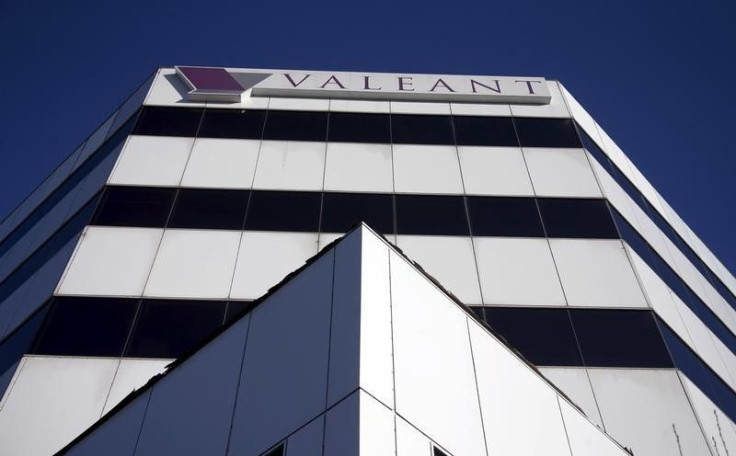Valeant Says Can Contain Hit To Dermatology, Projects 2016 Growth

(Reuters) - Drugmaker Valeant Pharmaceuticals International Inc
The company said it would rebuild lost business through a distribution agreement with Walgreens pharmacies announced on Tuesday, and said the arrangement would also help sales of products like Xifaxin for irritable bowel syndrome and Addyi, a new sexual dysfunction treatment for women.
The Canadian drugmaker forecast 2016 earnings would grow 30 percent to $13.25 to $13.75 per share off a lowered 2015 outlook, just below Wall Street's highest expectations.
Valeant shares rose 8 percent to $118.75 in New York trading, gaining ground as Chief Executive Michael Pearson led investors through a four-hour meeting in which he defended the company's plan to rebuild its dermatology business.
In October, shortseller Citron Research accused Valeant of having inflated revenue, and several news outlets including Reuters reported on how Philidor used aggressive tactics to try to increase insurer reimbursement, mostly for dermatology drugs. Valeant has denied the shortseller accusations and a board committee is investigating the Philidor situation.
The news had knocked shares from an August high of $263.70 to a low of $69.34 on Nov. 18. They have since recovered, helped in part as its largest investor, Bill Ackman's Pershing Square Capital Management, increased its stake.
Pearson declined to give an update on the investigation, or comment on investigations by U.S. prosecutors in New York and Massachusetts and by Congress over the company's history of price increases and its patient access programs.
He denied that the company was considering a break-up, a possibility raised by large investors as a way to recover value, and told investors that the Philidor situation was behind them.
The company stopped using Philidor in October, losing 20 percent of its dermatology prescriptions and $250 million in sales in the fourth quarter, Pearson said. Valeant also rolled back all price increases it had planned during the quarter.
"We've moved on from Philidor. We ended our relationship and now we have Walgreens. Walgreens is about as reputable as you can get," Pearson said.
Valeant's announcement on Tuesday of the distribution deal with Walgreens Boots Alliance Inc
The two largest U.S. drug benefit managers, Express Scripts Holdings Corp
CVS Health CEO Larry Merlo told investors at its own investor meeting on Wednesday that the agreement between Valeant and Walgreens appeared to be an attempt to circumvent its policies meant to drive down costs for insurers and employers. He noted the government does not approve of these programs or allow them in healthcare plans like Medicare.
2016 PROFIT OUTLOOK
Valeant, which has been criticized for a business model that depends on growth through purchasing companies and making large price increases on their older drugs, said 2016 sales would be driven by volume and pledged to cut prices.
Political pressure on price hikes, and a heavy debt load from buying Salix Pharmaceuticals as well as its stock decline, has forced Valeant to change strategy. It predicted no major deals next year but said it hoped to do some small purchases.
"That is a shift in strategy but it is one that is consistent with the way the world is going right now," Pearson said.
The new Walgreens agreement, which starts in January, will be similar to the one with Philidor, he said. Valeant will allow customers to receive the prescription immediately and take the risk that it may not receive reimbursement from pharmacy benefit managers down the road.
Pearson said that such payers would benefit from price cuts on more than 30 branded products to match generic prices. Customers would benefit from the patient access program, in which it offers coupons or zero co-pays to cut the patient price.
A poll of more than 200 investors by ISI Evercore recently found about 25 percent expected 2016 earnings of about $14 per share and 23 percent expected $13 per share.
Valeant forecast that another closely watched metric, cash earnings, would be $6.9 billion to $7.1 billion in 2016. It said that was about $500 million lower than previously forecast because of the costs of setting up the Walgreens deal, about $75 million in retention payments it has planned for 700 employees, planned price cuts and restructuring charges.
About 22 percent in the ISI Evercore poll expected cash earnings of $6.5 billion and 18 percent expected $6.75 billion.
Valeant also said it will cut its debt by about $2.25 billion in 2016 and book revenues of $12.5 billion to $12.7 billion, compared with 2015 sales it estimated at $10.4 billion to $10.5 billion.
The company cut its 2015 profit forecast to $10.23-$10.33 per share from $11.67-$11.87.
(Reporting by Caroline Humer in New York and Vidya L Nathan in Bengaluru; Editing by Sriraj Kalluvila, Jeffrey Benkoe and Meredith Mazzilli)
Published by Medicaldaily.com



























